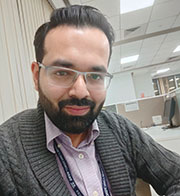Series to Highlight Young Professionals in Signal Processing: Dr. Angshul Majumdar

 This issue brings to you our interview with Dr. Angshul Majumdar (M’2012, SM’2016), an associate professor at Indraprastha Institute of Information Technology, Delhi, India. He has co-authored more than 80 journal articles and 100 conference proceedings. He has authored two books - Compressed Sensing for Magnetic Resonance Image Reconstruction, published by Cambridge University Press (2015), and Compressed Sensing for Engineers, published by CRC Press (2019). He has co-edited two books - Deep Learning in Biometrics and MRI: Physics, Reconstruction and Analysis, both published by CRC Press. He has two granted US patents and six more filed.
This issue brings to you our interview with Dr. Angshul Majumdar (M’2012, SM’2016), an associate professor at Indraprastha Institute of Information Technology, Delhi, India. He has co-authored more than 80 journal articles and 100 conference proceedings. He has authored two books - Compressed Sensing for Magnetic Resonance Image Reconstruction, published by Cambridge University Press (2015), and Compressed Sensing for Engineers, published by CRC Press (2019). He has co-edited two books - Deep Learning in Biometrics and MRI: Physics, Reconstruction and Analysis, both published by CRC Press. He has two granted US patents and six more filed.
Angshul is a very active member of the IEEE SPS. He started the SPS Chapter in Delhi, India in 2015. He has organized two seasonal schools in Delhi - Winter School and Workshop in Machine Intelligence and Signal Processing (2014) and Winter School on Machine Learning for Biometrics (2017). He has been the finance chair of the IEEE ISBA (2017). He has been the Chair of the SPS Chapter’s Committee (Membership board) from 2016-18 and served as the chair of the SPS Educational Committee (2019). Currently, he is a member-at-large in the SPS Educational Board. Angshul has co-organized special sessions at EUSIPCO 2018, ICASSP 2019. He and ICASSP 2020. He has also been an area chair for ICASSP 2020 and ICIP 2020. Angshul (along with this student) won the best paper award for ‘Matrix Factorization Model using Kacmarz Algorithm: Application in Sensor Localization’ at IEEE DSP 2015. Angshul has completed four projects funded by the department of science and technology, govt of India, and one project funded by US Air Force Research Labs. He currently has two projects funded by the department of science and technology, govt of India. He has a strong connection with the industry. He has been the research advisor to Tata Consultancy Services since 2017.
We approached Dr. Angshul Majumdar with a few questions:
Q. Please provide a brief background about yourself.
I am currently an associate professor at the Indraprastha Institute of Information Technology Delhi (IIITD). I am associated with the department of electronics and communication engineering and the Infosys center for artificial intelligence. IIITD is a relatively new institute; it started in 2008. In a very short time, the institute has established itself as a leader in data science and machine learning. It offers a host of interdisciplinary undergraduate programs including bachelor’s degrees in Artificial Intelligence, Computational Design, Computational Social Sciences, and Computational Biology to name a few. The center for artificial intelligence is the largest privately funded industry-academia research center on this topic in the country.
I completed my Ph.D. from the University of British Columbia in 2012 in electrical and computer engineering under Dr. Rabab K. Ward. My thesis was on accelerating MRI acquisition via compressed sensing. Prior to that, I did my Master’s from the same university in 2009. Later I wrote a book on the same topic, published by Cambridge University Press.
My current interests lie at the intersection of signal processing and machine learning. In terms of applied areas, my focus is currently on bioinformatics and energy analytics. In the past, I have worked on remote sensing, medical imaging, and biomedical signal processing.
I have been a passionate salsa dancer since my grad school days. Since, returning to India, I have taught salsa and allied Latin dances to my students at IIITD. In the current lockdown, I developed a new hobby of fermenting / wine-making.
Q. How does your work affect society?
My past works in compressed sensing dealt with the question of how software (signal processing) can help (reduce cost) with the hardware design. The prime example of this problem had been accelerating MRI scans via compressed sensing (CS). Later on, I (along with my IIITD colleague) worked on the problem of reducing the hardware complexity of hand-held radars using CS. Collaborating with one of my colleagues from hardware systems, we designed CS-inspired energy-efficient hardware for biomedical signal acquisition (primarily for wearable body area network).
Currently, my work in energy analytics focuses on computational sustainability concentrating on demand-side management. The question, I try to answer is how signal processing and machine learning can be used to aid in better modifying customer’s energy consumption patterns to reduce wastage. Technically, it is a combination of energy disaggregation, demand forecasting, and anomaly detection.
I would specifically like to highlight one work in bioinformatics that I am carrying out with my Ph.D. student. We are working on the problem of drug repositioning for COVID-19. Since bringing in a new drug is a costly time-consuming affair, and the world is in desperate need of a cure, we are trying to figure out by computational means if some of the existing drugs (approved by agencies such as FDA) can be (re-)used for COVID-19.
Q. How is your work related to signal processing?
I work at the interface of signal processing and machine learning; strictly speaking, I do not see any distinction between the two. The algorithmic aspects of my work are intimately related to signal processing. For example, dictionary and transform learning are well-known products of signal processing. Taking these as the basic building blocks, my research group developed the framework of deep dictionary learning. The framework is capable of learning in both supervised, unsupervised, and semi-supervised fashion. It can be used for domain adaptation tasks, and for solving inverse problems. Currently, we are developing clustering techniques with this framework.
Q. How has your involvement with the IEEE SPS helped you in building your career?
My association with IEEE, in particular with signal processing society started in 2008 when I had to register for my first ICASSP at Las Vegas. Since, then I have been a student member, a member, and currently a senior member. Association with IEEE helped me in networking. By developing professional relationships with my senior colleagues, I have been given the chance to serve as an associate editor for the Open Journal of Signal Processing and Transactions on Circuits and Systems for Video Technology.
I was given the opportunity to open the IEEE SPS Chapter in New Delhi, India in 2015; and served as its chapter chair till the end of 2018. This, in turn, helped me network with the SPS organization. I was inducted as the Chapter’s Committee chair under the IEEE Membership Board from 2016-2018. Later on, I served as the chair of the Education Committee under the same board (2019). With the development of the new Education Board, I serve as one of its members-at-large.
Q. Anything else that you would like to add?
I have been in academia for the majority of my career, but I have always been in touch with the industry. I worked in business consulting at the beginning of my career. Currently (since the beginning of 2017), I am a research advisor to the TCS innovation lab. TCS or Tata Consultancy Services is one of the top three software services companies in the world. I work with them primarily on three areas – i) multi-sensor information fusion, ii) hybrid learning (a combination of deep learning and signal processing), and iii) deep neural network compression.

